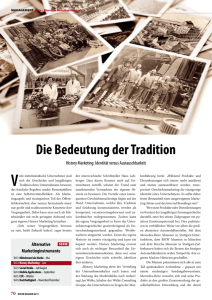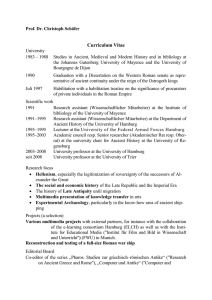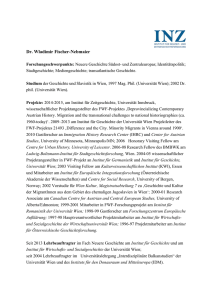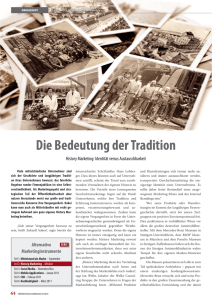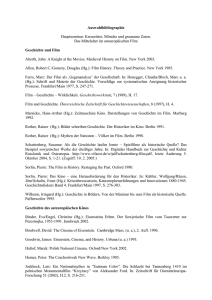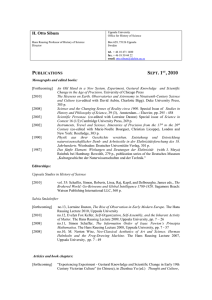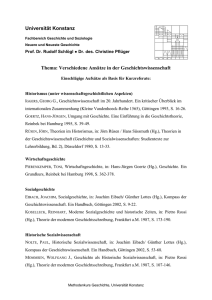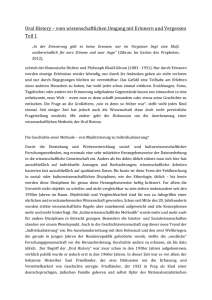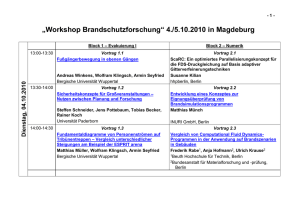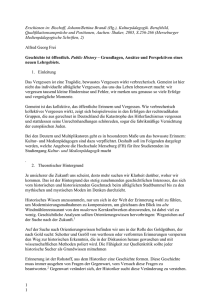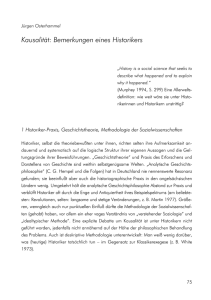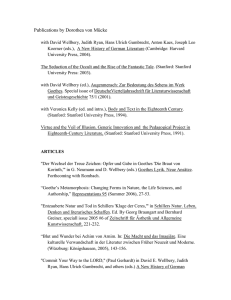Prof. Dr. Ute Planert - University of Toronto
Werbung
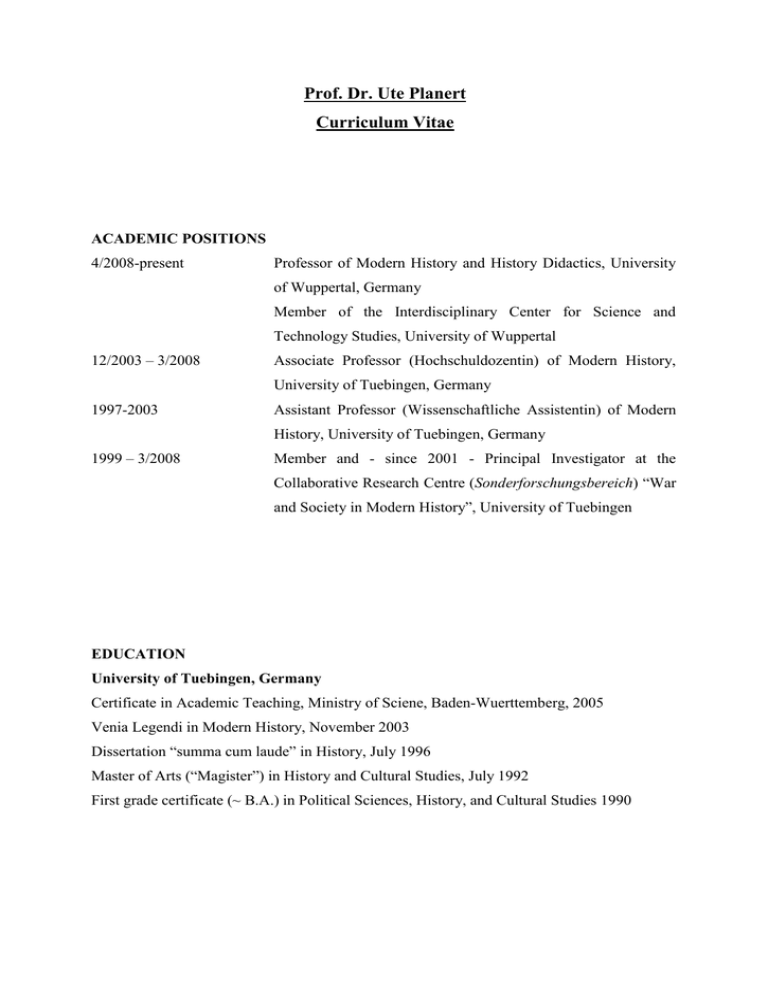
Prof. Dr. Ute Planert Curriculum Vitae ACADEMIC POSITIONS 4/2008-present Professor of Modern History and History Didactics, University of Wuppertal, Germany Member of the Interdisciplinary Center for Science and Technology Studies, University of Wuppertal 12/2003 – 3/2008 Associate Professor (Hochschuldozentin) of Modern History, University of Tuebingen, Germany 1997-2003 Assistant Professor (Wissenschaftliche Assistentin) of Modern History, University of Tuebingen, Germany 1999 – 3/2008 Member and - since 2001 - Principal Investigator at the Collaborative Research Centre (Sonderforschungsbereich) “War and Society in Modern History”, University of Tuebingen EDUCATION University of Tuebingen, Germany Certificate in Academic Teaching, Ministry of Sciene, Baden-Wuerttemberg, 2005 Venia Legendi in Modern History, November 2003 Dissertation “summa cum laude” in History, July 1996 Master of Arts (“Magister”) in History and Cultural Studies, July 1992 First grade certificate (~ B.A.) in Political Sciences, History, and Cultural Studies 1990 Prof. Dr. Ute Planert, Bergische Universität Wuppertal 2 GRANTS AND HONORS 2012/2013 Hannah Arendt Visiting Chair for German and European Studies, Munk School of Global Affairs, University of Toronto/Canada Since 2011 Co-Editor of the peer reviewed journal “Archiv fuer Sozialgeschichte” (Archive of Social History) 4/2011-3/2012 Personal Research Grant by the German Research Foundation Autumn 2008 “History Book of the Year”-Award in Modern History for “The Myth of the Wars of Liberation” by an international selection committee for the German branch of the H-Net-Association Autumn 2007 Visiting Scholar at the Minda de Gunzburg Center of European History, Harvard University 1997-1999 Margarete von Wrangell-Scholarship, Baden-Wuerttemberg Selected Publications Monographs ● Antifeminismus im Kaiserreich. Diskurs, soziale Formation und politische Mentalität (Antifeminism in the German Kaiserreich. Discourse, Social Formation, and Political Mentality). Kritische Studien zur Geschichtswissenschaft, Bd. 124. Goettingen: Vandenhoeck and Ruprecht 1998. ● Der Mythos vom Befreiungskrieg. Frankreichs Kriege und der deutsche Süden. Alltag, Wahrnehmung, Deutung, 1792-1841 (The Myth of the Wars of Liberation. The French Wars and Southern Germany. Everyday Life, Perception, Reinterpretation, 1792-1841). Paderborn: Schoeningh 2007. Prof. Dr. Ute Planert, Bergische Universität Wuppertal 3 ● Europa zwischen Aufbruch und Tradition: Französische Revolution und napoleonisches Imperium, 1789-1815 (Europe between Modernity and Tradition: French Revolution and Napoleonic Empire), work in progress, forthcoming 2013. Edited Volumes ●.Nation, Politik und Geschlecht. Frauenbewegungen und Nationalismus in der Moderne, (Nation, Politics, Gender. Women’s Movements and Nationalism in Modern History). Frankfurt/Main: Campus 2000. ● Krieg und Umbruch in Mitteleuropa um 1800. Erfahrungsgeschichte(n) auf dem Weg in eine neue Zeit (War and Transformation around 1800. French Central Europe at the Edge of Modernity). Paderborn: Schoeningh 2009. ● Vom Wandel eines Ideals: Bildung, Universität und Gesellschaft in Deutschland (Alterations of a Prototype: Education, University, and Society in Germany). Bonn: Dietz 2010 (co-ed. Nikolaus Buschmann) ● Militärische Erinnerungskulturen 1400-1900 (Cultures of Military Remembrances, 14001900), Goettingen: Vandenhoek 2012 (co-edited with Horst Carl, Giessen) ● Napoleon’s Empire – European Politics in Global Perspective (conference volume, in progress) Prof. Dr. Ute Planert, Bergische Universität Wuppertal 4 Selected Articles and Book Chapters ● European History • Nationalismus und Gewalt (Nationalism and violence) in: Gewalt. Ein interdisziplinäres Handbuch, ed. Christian Gudehus, Michaela Christ und Harald Welzer, erscheint Stuttgart/Weimar: Metzler 2013 (in print). • Ami ou ennemi? Expériences de guerre et d’occupation au temps de la Révolution francaise et Napoléon, in: Christian Windler/Bernard Gainot (ed.), Neutralités et accommodements. Histoire comparée des arrangements face à la guerre et à l’occupation en Europe (in print). • Woman Suffrage and Antifeminism as Litmus Test of Modernizing Societies. A Western European Comparison, in: Oliver Müller/Cornelius Torp (eds.), Controversies about Imperial Germany, New York: Berghahn 2012. • International Conflict, War, and the Making of Modern Germany, 1740-1815, in: The Oxford Handbook of Modern German History, ed. Helmut Walser Smith, Oxford University Press, 2011. • Die Aufstände von 1808/1809 in der europäischen Geschichte: Eine Neuinterpretation, (1808/1809 in European History: Europe’s Transnational Insurrections Revisited), in: Brigitte Mazohl (Hg.), Triumph der Provinz. Geschichte und Geschichten 1809-2009 (in print). • Urban Elite versus the Peasantry, Reformers versus the Old Regime? Revolts and Rebellion in Napoleonic Central Europe, in: Michael Broers/Peter Hicks/Agustin Guimera (eds.), The Napoleonic Empire and the New European Political Culture (Palgrave, Basingstoke, UK, in print) • Patriotisme habsbourgeois et conscience nationale allemande: l’exemple du Brisgau, in : Christine Lebeau (ed.), A-t-on (encore ) besoin du territoire ? Des espaces en partage (in print) Prof. Dr. Ute Planert, Bergische Universität Wuppertal 5 • Innovation or Evolution? The French Wars in Military History, in: Roger Chickering/Stig Foerster (eds.), Wars in an Age of Revolution, 1775-1815, Cambridge: Cambridge University Press 2010 (Publications of the German Historical Institute Washington), pp. 69-84. • Liberalismus und Antifeminismus in Europa (Liberalism and Antifeminism in Europe), in: Angelika Schaser/Stefanie Schüler-Springorum (eds.), Liberalismus und Emanzipation. Inklusions- und Exklusionsmechanismen im Kaiserreich und in der Weimarer Republik, Stuttgart 2010, pp. 73-95. • From Collaboration to Resistance: Politics, Experience, and Memory of the Revolutionary and Napoleonic Wars in Southern Germany, in: Journal of Central European History, 39 (2006), No. 4, pp. 676-705 (Special Issue: 1806 and Its Aftermath: Revisiting the Period of the Napoleonic Wars in German Central European Historiographie). • „Wo jeder Franzmann heisset Feind“? Die vielfältigen Facetten des deutsch-französischen Verhältnisses im Zeitalter Napoleons (’Every Frenchmen an Enemy’? The Complexity of French-German Relations in the Era of Napoleon), in: Michael Epkenhans, Stig Förster, Karen Hagemann (eds.), Soldat und Gesellschaft. Biographie und Selbstzeugnisse in der Militärgeschichte, Paderborn: Schoeningh 2006, pp. 86-105. • Vn der Querelle des Femmes zum Bürgerrecht: Frauenbewegungen in Europa 1789-1945 (From the „Querelle des Femmes“ to Citizenship. Women’s Movements in Europe, 17891945), in: Bea Lundt/Michael Salewski/Heiner Timmermann (Hg.), Frauen in Europa: Mythos und Realität (Schriften der Europäischen Akademie Otzenhausen, Bd. 129), Münster 2005, pp. 424-443. • Historische Einblicke in „the private life of man". Sexualität, Familie, Männlichkeit und Politik in neueren Arbeiten zur englischen Sozialgeschichte (Historical Views on the Private Life of Man: Sexuality, Family, Manliness, and Politics in Recent Works on English Social History), in: Archiv für Sozialgeschichte 40 (2000), pp. 295-320. Prof. Dr. Ute Planert, Bergische Universität Wuppertal 6 ● Remembrance and Cultural Commemoration • Vorbild oder Feindbild? Das Zeitalter Napoleons im Gedächtnis des 19. und 20. Jahrhunderts, erscheint in: Jahrbuch für Europäische Geschichte 2013. • Wzór – wróg – wzór. Napoleon i jego czasy w niemieckiej pamięi historycznej (From Model to Bogeyman – and Back? Napoleon and His Time in Cultural Commemoration), in: Zdzislawa Nogi/Martin Schulze Wessel (Hg.); Pamięć polska, pamięć niemiecka od XIX do XXI wieku, Torun 2009 (on behalf of the Polish and the German Historical Organization), pp. 78-126. •Auf dem Weg zum Befreiungskrieg: Das Jubiläum als Mythenstifter. Die Re-Interpretation der napoleonischen Zeit in den ehemaligen Rheinbundstaaten (On the Road to the War of Liberation. Anniversaries as Myth-Makers: Reinterpreting the French Past in the Ex-States of the Confederation of the Rhine), in: Winfried Müller (Hg.), Das historische Jubiläum. Genese, Ordnungsleistung und Inszensierungsgeschichte eines institutionellen Mechanismus, Münster 2004, S. 195-219. • Zwischen Alltag, Mentalität und Erinnerungskultur. Erfahrungsgeschichte an der Schwelle zum nationalen Zeitalter (Between Every Day Life, Mentality, and Commemoration: The History of Experiences at the Edge of the National Age), in: Nikolaus Buschmannn/Horst Carl (ed.), Die Erfahrung des Krieges. Erfahrungsgeschichtliche Perspektiven von der Französischen Revolution bis zum Zweiten Weltkrieg, Paderborn u.a. 2001, pp. 51-66. ● Military History • Ami ou ennemi? Expériences de guerre et d’occupation au temps de la Révolution francaise et Napoléon, in: Christian Windler/Bernard Gainot (ed.), Neutralités et accommodements. Histoire comparée des arrangements face à la guerre et à l’occupation en Europe (in print). • „Der grausamste Weltkrieg, der je die Gesellschaft erschütterte“. Die europäischen Kriege um 1800: Frühneuzeitliche Tradition oder der Beginn des Totalen Krieges? („The Cruelest War Ever“. War in Europa around 1800: Early Modern Traditions or the Beginning of Total Prof. Dr. Ute Planert, Bergische Universität Wuppertal 7 War?), in: Dietrich Beyrau/Michael Hochgeschwender/Dieter Langewiesche (eds.), Formen des Krieges. Von der Antike bis zur Gegenwart, Paderborn: Schoeningh 2007, pp. 149-162. • Conscription, Economic Exploitation and Religion in Napoleonic Germany, in: Philip G. Dwyer/Alan Forrest (eds.), Napoleon and His Empire: Europe, 1804-1814, London: Palgrave Macmillan, 2007, pp. . 133-148. • Reichspatriotismus und dynastisch-nationale Kriegsmobilisierung am Ende des 18. Jahrhunderts: Das Freiburger Bürgermilitär in den Kriegen der Französischen Revolution (Patriotism, Nationalism, and Dynastic Mobilization at the End of the 18. Century: The French Wars and the Case of Freiburg’s Militia Men), in: Rüdiger Bergien/Ralf Pröve (eds.), Spießer, Patrioten, Revolutionäre. Militärische Mobilisierung und gesellschaftliche Ordnung in der Neuzeit, Göttingen 2010, pp. 215-234. Der Stellenwert der Religion in den Kriegen der Französischen Revolution und Napoleons (Religion in the French Wars), in: Franz Brendle/Anton Schindling (Hg.), Religionskriege im Alten Reich und in Alteuropa, Münster 2006, pp. 419-431. • Wessen Krieg? Welche Erfahrung? Oder: Wie national war der „Nationalkrieg" gegen Napoleon? (“Whose War? Which Experience? Or: How National was the ‘National War’ Against Napoleon?), in: Dietrich Beyrau (Hg.), Der Krieg in nationalen und religiösen Erfahrungen, Tübingen 2001, pp. 111-139. • Staat und Krieg an der Wende zur Moderne. Der deutsche Südwesten um 1800 (State and War at the Edge of Modernity. The German South West around 1800), in: Werner Rösener (Hg.), Staat und Krieg - vom Mittelalter bis zur Moderne. Göttingen 2000, pp. 159-180. • Wie man aus Menschen macht. Aus der Trickkiste militärischer Erziehung (Men Into Soldiers: Military Education’s Bag of Tricks), in: Der aufrechte Gang. Zur Symbolik einer Körperhaltung, Tübingen 1990, pp. 78-87. Prof. Dr. Ute Planert, Bergische Universität Wuppertal 8 ● Nationalism • Bonapartismus und Nationalismus in der Berliner Klassik: Goethe, Zelter und der deutsche Männergesang (Bonapartism and Nationalism in Berlin’s Classical Age: Goethe, Zelter and Male Choral Societies), in: Axel Fischer/Matthias Kornemann (Hg.), Integer vitae - die Zeltersche Liedertafel als kulturgeschichtliches Phänomen (Berliner Klassik. Großstadtkultur um 1800, hg. v. d. Berlin-Brandenburgischen Akademie der Wissenschaften), Berlin 2012. • Wann beginnt der „moderne“ deutsche Nationalismus? Plädoyer für eine nationale Sattelzeit, in: Jörg Echternkamp/Sven O. Müller (Hg.), Die Politik der Nation. Deutscher Nationalismus in Krieg und Krisen, 1760-1960 (Is there a Starting Point of German Nationalism? A Plea for an Interim Stage in the History of Nationalism), in: Jörg Echternkamp/Sven O. Müller (eds.), The Politics of the Nation. German Nationalism in War and Crisis, 1760-1960, Munich 2002, pp. 25-59. • Zwischen Partizipation und Restriktion. Frauenemanzipation und nationales Paradigma von der Aufklärung bis zum Ersten Weltkrieg (Between Participation and Restriction. Women’s Emancipation and the National Paradigm from the Enlightenment to First World War), in: Dieter Langewiesche/Georg Schmidt (Hg.): Föderative Nation, München 2000, pp. 387-428. • Vater Staat und Mutter Germania. Zur Politisierung des weiblichen Geschlechts im 19. und 20. Jahrhundert (Father State and Mother Germania. The Politicization of Women in the 19th and 20th Centuries), in: Ute Planert (ed.), Nation, Politik und Geschlecht. Frauenbewegungen und Nationalismus in der Moderne, Frankfurt/Main 2000, pp. 15-65. ● Antisemitism, Voelkish Movement, Nazi Germany • Kulturkritik und Geschlechterverhältnis. Zur Krise der Geschlechterordnung zwischen Jahrhundertwende und „Drittem Reich (Gender Order and the Awareness of Crisis: From Finde-Siècle to National Socialism), in: Wolfgang Hardtwig (ed.), Remedies of Crisis. Politics of Culture in Germany, 1900-1933, Munich 2007, pp. 191-214. Prof. Dr. Ute Planert, Bergische Universität Wuppertal • Mutter und Volk. 9 Vom Antifeminismus zur völkischen Bewegung und zum Nationalsozialismus (Mother and Folk. From Antifeminism via the Voelkish Movement to National Socialism), in: Eva Schöck-Quinteros/Christiane Streubel (Hg.), „Ihrem Volk verantwortlich“. Frauen der politischen Rechten (1890-1933). Organisationen – Agitationen – Ideologien, Berlin 2007, pp. 109-130. • Reaktionäre Modernisten? Zum Verhältnis von Antisemitismus und Antifeminismus in der völkischen Bewegung (Reactionary Modernizers? Antifeminism, Antisemitism, and the Radical Right), in: Jahrbuch für Antisemitismusforschung 11 (2002), pp. 31-51. • Weibliche Schmutzkonkurrenz und männliche Ehre. Geschlechterbilder als Machtfaktor der Interessenpolitik im Deutschnationalen Handlungsgehilfenverband 1893-1918 (Female Rivalry and Manly Honour. Gender Stereotypes as a Means of Industrial Action. The Antifeminist Policy of the German-National Employee Union, 1893-1918), in: Internationale Wissenschaftliche Korrespondenz zur Geschichte der Arbeiterbewegung 34 (1999), vol. 3/4, pp. 441-464. ● Racial Hygiene and Eugenics • „Weise Zuchtwahl der Tüchtigen“ und die „Pflicht, gesund zu sein“: Rassenhygiene und Körperpolitik im frühen 20. Jahrhundert (‚Thoughtful Selection of the Fittest’ and the ‚Duty to be Healthy’: Racial Hygiene and Body Politics in the early 20th Century), in: Die Philosophin 13 (2002), vol. 25, Schwerpunkt: Feministische Theorie, Bioethik und Biopolitik, pp. 54-69. • Der dreifache Körper des Volkes: Sexualität, Biopolitik und die Wissenschaften vom Leben (The Three Bodies of the People: Sexuality, Biopolitics, and Life Science), in: Geschichte und Gesellschaft 26 (2000), vol. 4, pp. 539-576. Prof. Dr. Ute Planert, Bergische Universität Wuppertal 10 ● Gender History • „Mannweiber, Urniden und sterile Jungfern“. Die Frauenbewegung und ihre Gegner im Kaiserreich (Viragos, Urnids, and Sterile Spinsters. Women and Their Enemies in Imperial Germany), in: Feministischen Studien 18 (2000), vol. 1, pp. 22-35. • Antifeminismus im Kaiserreich: Indikator einer Gesellschaft in Bewegung (Antifeminism in Imperial Germany: Indicator of a Modernizing Society), in: Archiv für Sozialgeschichte 38 (1998), pp. 93-116. • Im Zeichen von "Volk" und "Nation": Emanzipation durch Emanzipationsgegnerschaft? (In the Name of Folk and Nation: Emancipation by Antifeminism?), in: Frauen und Nation, Tübingen 1996, pp. 190-203. EDITORIAL AND ADVISORY BOARDS • Co-Editor “Archiv fuer Sozialgeschichte“, Bonn (Peer Reviewed Journal) • Co-Editor “Power and Social Systems in Early Modern Europe” (book series) • Bismarck-Stitching, Advisory Board
